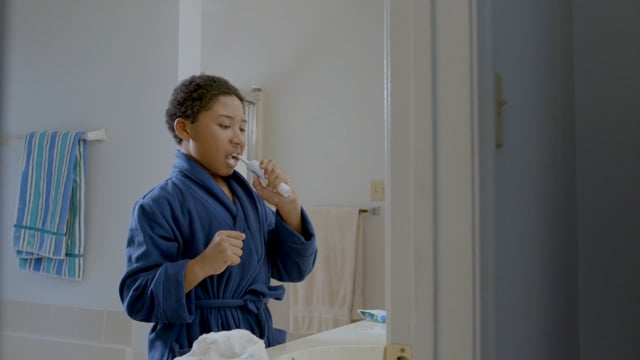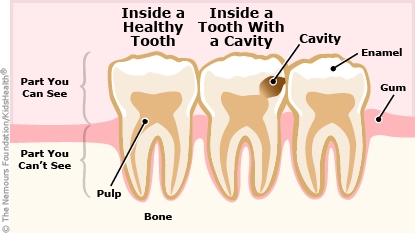Keeping Your Child's Teeth Healthy
Our teeth help us eat, talk, and smile. To keep your child’s teeth healthy, start good dental habits early. Keeping the teeth clean (through brushing and flossing), going to the dentist regularly, and making sure kids get enough fluoride are the best ways to keep teeth healthy.
-

Caring for Your Child's Teeth
Good oral health starts even before your child's first tooth comes in. Learn to keep your child's teeth healthy from infancy and beyond.
Why Is Teeth Cleaning Important?
Cleaning the teeth (with brushing and flossing) prevents the buildup of . Plaque is a clear, sticky material made up of bacteria (germs). It can build up and lead to:
- Cavities. A cavity is a hole in a tooth that, without treatment, can grow bigger and deeper.
- Gum disease. This irritation of the gums happens when plaque is left on the teeth. Over time, gum disease can lead to sore, bleeding gums, and even tooth loss.
How Can Kids Keep Their Teeth Clean?
Even before your baby’s first tooth comes in, it’s important to keep the gums clean by gently rubbing a clean, damp washcloth over the gums after each feeding.
After that:
- Children under 3 years old: Help your child brush twice a day for 2 minutes with a soft toothbrush with a smear (the size of a grain of rice) of fluoride toothpaste.
- Children 3 years old and older: Help your child brush twice a day for 2 minutes with a pea-size amount of fluoride toothpaste. Teach your child to spit the toothpaste out. When your child has teeth that touch, help them floss once a day.
- Children 10 years and older: They usually can brush and floss on their own. Help them remember to brush twice a day for 2 minutes each time and floss once a day.
When Should Kids Go to the Dentist?
Your child should see a dentist within 6 months of the first tooth coming in OR by their first birthday (whichever comes first). Going at a young age can catch problems early. And your baby will get used to the dentist looking in their mouth.
As kids get older, they should go to the dentist on a regular schedule. It’s usually between every 3 months to once a year. Ask your dentist what’s right for your child.
What Happens at Dentist Visits?
During the first visits to the dentist, your baby will sit on your lap and the dentist will do a short exam. As your child grows, the dental checkup will include a thorough cleaning of the teeth by a dental hygienist and an exam by the dentist (to check the teeth and gums).
The dentist may also recommend X-rays to see inside the teeth and check for decay, a fluoride treatment that is brushed onto the teeth (to prevent cavities), or a dental sealant (a coating painted on the teeth to prevent tooth decay).
How Can I Make Sure My Child Gets the Right Amount of Fluoride?
Fluoride is a mineral found in the soil and water. It strengthens tooth enamel (the hard outer covering of the teeth). By keeping the enamel strong, fluoride helps prevent cavities.
To make sure your kids get the right amount of fluoride:
- Check to see if your drinking water has fluoride in it. If it doesn’t, or if you have a well, talk to your dentist about a fluoride supplement.
- Work with your health care provider or dentist to find the right schedule for getting fluoride treatments put on your child’s teeth.
- When kids are old enough to rinse and spit (usually at about age 6), ask your dentist if they should also use a fluoride mouthwash.
When Should I Call the Doctor or Dentist?
Call your doctor or dentist if your child has tooth or gum pain, a broken tooth, dark or light spots on their teeth, or if a tooth falls out from a fall or injury.
What Else Should I Know?
Other healthy-teeth tips:
- Start offering babies a cup with breast milk, formula, or water in it when they’re around 6 months old. Use either a cup without a lid or a cup with a valveless lid. By 1 year of age, kids should be off the bottle and using a cup instead.
- Do not give juice to babies younger than 12 months old. If you decide to give juice after that, give less than 4 ounces a day to toddlers, less than 6 ounces a day to kids ages 4–6, and less than 8 ounces to kids over age 7. Always use 100% fruit juice, serve it in a cup (not in a bottle), and give it at mealtimes only.
- Don’t let your child go to bed with a bottle or sippy cup with milk or juice in it. Don’t let them sip on a bottle or sippy cup throughout the day with anything but water in it.
- Limit sugar-sweetened beverages (like soda, juice drinks, sports drinks, and flavored milks) and sugary snacks (especially sticky candy). If your child does have these, serve at mealtimes, and have them brush their teeth after.
- Make your home and car smoke-free. Children that are around secondhand smoke are more likely to get cavities. If you or anyone in your household smokes, call (800) QUIT-NOW or go to smokefree.gov for tips and advice on quitting.

